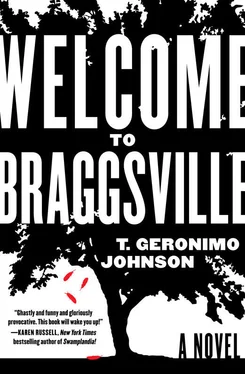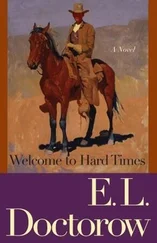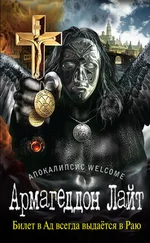Your mom’s so friendly, Louis added.
Daron nodded glumly; handlebar-headed was more like it. She’s not normally so saccharine.
Before leaving Cali, they had agreed to speak French or Spanish as necessary for security, but Daron knew his mother wouldn’t know that word anyway, at least not as an adjective. Nonetheless, a hurt look passed across her face.
Play what you like on the radio, she offered in a grim voice, jerking the seat belt as if closing a coat against the cold.
With Louis cooking up a story about every trucker they passed, and Charlie explaining to Daron’s mom what life was like as a poor kid in a rich boarding school, something he’d never even mentioned to Daron, the two-hour drive passed pleasantly enough, and before he knew it, Candice, who read every single printed letter and punctuation mark along the highway (emphasizing the many Indian names) — a fact Daron was glad to have learned before they went on an extended road trip — yelled, Welcome to Braggsville, The City That Love Built in the Heart of Georgia, Population 712. Was there a Bragg? Candice asked.
Sure was.
Signs for the reenactment adorned every corner, each one a line drawing of a Civil War soldier superimposed over the Confederate battle flag. The signs promised THRILLING HISTORY AND HERITAGE, BREATHTAKING SCENERY AND SOUND EFFECTS, and the EDUCATIONAL EXPERIENCE OF A LIFETIME all at the Pride Week Patriot Days Festival. Red, white, and blue lights strung across Main Street blinked, illuminating the matching streamers wrapped around the light poles. Enormous Confederate flags dressed the watchtower — strung high enough to ensure passersby a clear view of the memorial plaques dotting each of the walls. Four men in full Confederate regalia stepped into the crosswalk, spaced like the Beatles on the Abbey Road album cover, one even barefoot. Candice fumbled over her iPhone.
Dear, don’t you ask people before taking their photograph? asked Daron’s mom as she steered the car into the parking lot of Lou Davis’s Cash-n-Carry Bait Shop and Copy Center.
Excuse me, ma’am. Candice, surprisingly chagrined, powered off her phone and slipped it into her pocket.
Lou’s? asked Daron.
They’re expanding, she explained. To Candice, she smiled. No need to apologize.
Lou’s? asked Daron.
Look at it. They’re expanding.
Lou Davis’s was designed in the style of an old general store with a faux plank face. Old Man Davis had torn down the original dovetail chink log cabin and replaced it with this cinder-block structure back in the forties. For a long time, it was the town’s central landmark. (Everything was measured by its distance from Lou’s, the watchtower, or the tree known as Miss Keen, even though that old sweet gum had long ago been debilitated by canker and had succumbed, at last, to a careening Walmart rig driven by a Mexican barely tall enough to see over the instrument panel and so when the stewing citizens arrived at the scene to find only one slight young man no taller than a three-year-old Christmas tree, they assumed that the operator had run off and took pity on the young Latino. The state trooper had called him, One lucky jumping bean. No one likes Walmart. They tolerate it because it’s cheap, but no one likes it.) When the reenactments were reinstated back in the 1950s in response to mandated integration, Lou installed the fake wood front, For the sake of authentic-nessity. (Lou used — nessity the way Gulls used Texas Pete hot sauce.) A room that doubled the size of the store was now being added to the right, jutting out into the parking lot. A handmade sign with a border of roses drawn with a highlighter promised that dine-in seating was coming soon, though obviously not in time for this year’s reenactment. Daron recognized Lee Anne’s writing and wondered if she’d be working. The exposed cinder blocks contrasted with the wooden front, reminding Daron that the store wasn’t historic, only dirty and cluttered. Inside, though, was cleaned up significantly. It was brightly lit, the new tile floor shiny, and, the biggest surprise, central air had replaced the dusty old black fan. (I love the sound of a compressor in the summer, a line the locals often intoned in the manner of Robert Duvall in Apocalypse Now .) Rheanne Davis, Lou’s youngest granddaughter and one of Daron’s early hitches, and with whom he had shared many a milk shake for one summer in high school, sat behind the register reading People . Behind her was the updated copy center, an all-in-one inkjet printer and scanner. Back then he’d been heartbroken by her decision to take time apart, and wrote her every night for a month, though he never mailed the letters. He wasn’t that foolish. He did, however, relish this moment to introduce her to his new friends, but hoped she wouldn’t mention their previous relationship, not with those bleached bangs and the T-shirt dress.
Welcome back, Little D.
Hi, Rheanne. These are my friends from—
Hi, Little D’s friends.
He rattled off their names, but she’d already returned her attention to her magazine. No handshaking and hugging here.
At the back of the store Lou had installed a new deli counter, behind which stood his oldest granddaughter and Rheanne’s older sister, Lee Anne, who waved politely from her folding chair, positioned so that she could watch The Voice on the television in the corner.
Welcome back, Little D.
Hi, Lee Anne, these are my friends—
Hi, Little D’s friends. What are all y’allses names?
His mom rushed through the introductions. They were in a hurry, she explained as she gave her order.
Three pounds of three kinds of meat? Sliced? Lee Anne groaned. You coulda called that in, Miss Janice.
I realize that, Lee Anne, that’s why it’s an emergency order, because I wasn’t able to plan ahead, and pick up my son and his wonderful friends, who flew clear across the country to see our little festival. I had a lot to do to prepare for this trip, and now that I have an emergency, I knew I had to come here, and not up the road to that big cold box.
Of course. Lee Anne’s voice softened at the mention of the big cold box, the mart that was to remain unmentioned, but apparently appreciation wasn’t ample motivation. Lee Anne had graduated only two years before Daron, but she already moved like her grandfather Lou himself, and five minutes surely passed while she shuffled to the deli case, turned over several slabs of meat before finding the right one, peeled the plastic back, adjusted the slicer, washed her hands, and, finally ready to begin — no, not yet, it seemed — brushed aside a few stray hairs with her bare hands, made a face of intense concentration, flipped the switch on the machine, and guided the meat across. Lee Anne took a deep breath. A single slice of ham fainted across the wax paper like a Southern belle in sight of a chaise lounge. She exhaled dramatically. One!
Louis and Candice snuck a glance at each other that said, No fucking way this can be serious.
Just joking. I like to do that for the tourists.
Daron’s relief was physical.
A young girl of no more than seven came in walking on her heels and stood beside Daron’s mother. He recognized her as Irene’s daughter Ingrid.
Hello, dear. Daron’s mother raised her voice to be heard over the slicer. How are you today?
Fine, ma’am.
Doing some shopping for your mommy?
For myself, ma’am.
Lee Anne stopped slicing. The whirring blade slowed and the sound of the motor faded. Do you need something from this here counter, Ingrid? I done told you this here AC ain’t free.
Yes, ma’am, Lee Anne. Two slices of bologna and two slices of cheese.
Lee Anne glared at her, holding the stare while picking up a microphone, unnecessarily as it turned out, and yelling, We need backup at the deli counter. Rheanne slammed her People down like last week’s TV Guide and stomped to the back of the store. Candice approached the deli counter with a handmade doll in her outstretched hands. How much is this?
Читать дальше
Конец ознакомительного отрывка
Купить книгу












